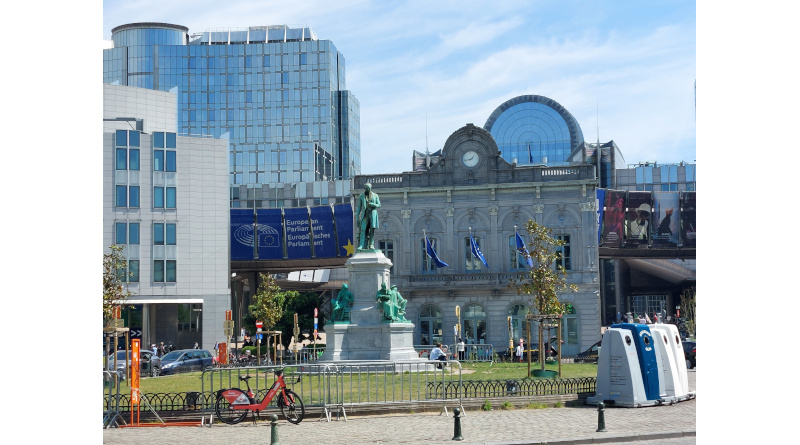Back on the Road… Welcome to Brussels!
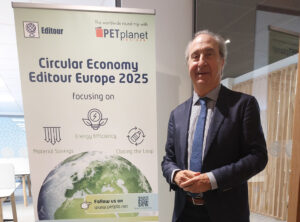
It has been a while since I’ve been travelling with our Editour Road Show. With fond memories of the North America Road Show 2018 and the European Road Show 2022 still in mind, I packed my suitcase and set off for Brussels.
The European Circular Economy Road Show 2025 is a bit different from the previous ones. This time, we’re not only asking our interviewees about new products or improvements in machinery efficiency, but also about their views on the circular economy and the implementation of sustainable work processes, in line with EU directives such as the CSRD, certifications, and process transformations.
To get the latest updates on EU regulations and ongoing discussions, my journey fittingly began in Brussels at PETCORE EUROPE. There, I met Antonello Ciotti, Chairman at PETCORE EUROPE; Maria Trofimova, Senior Communications Advisor; and Eduard Zagan, Office Coordinator.
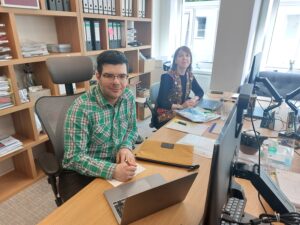
Antonello, with his charming and enthusiastic Italian manner, explained to me that the SUP Directive still needs to be fully implemented and that within the PPWR, the goals of the SUPD have shifted. He sees PETCORE’s role as providing clarity and helping to interpret these regulations across the entire PET value chain. He also shared insights from PETCORE’s involvement in UNEP discussions aimed at tackling plastic pollution – an issue he believes cannot be solved by reducing plastic production. Instead, he proposed Extended Producer Responsibility (EPR) schemes: a policy approach that makes manufacturers accountable for their products throughout their entire life cycle, including post-consumer stages. This, he argues, is key to achieving environmental goals such as recycling targets. In addition, Antonello advocated for global “Design for Recycling” guidelines for PET applications. We also touched on the Asian market. As you can see, our conversation ranged from the micro to the macro – and everything in between.
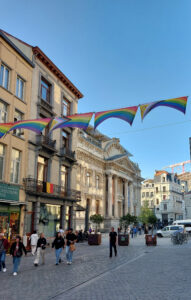
After this enlightening exchange, I returned to my accommodation in Brussels’ old town, my mind buzzing with thoughts. As I passed the colourful flags of the LGBTQ+ celebrations, I couldn’t help but wonder: were they made from recycled PET fibres?
The next day, I returned to the heart of the EU district in Brussels. Just a stone’s throw from the European Parliament, I was warmly welcomed by Inês Rebelo, Senior Communications Manager at UNESDA Soft Drinks Europe, and Nicholas Hodac, General Director of the organisation. I had already seen Nicholas speak at several panel discussions during PETCORE’s annual conferences and was delighted to finally meet him – and Inês – in person.
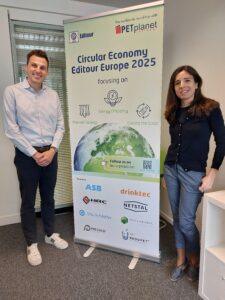
The incredibly pleasant atmosphere made the time fly by. Nicholas spoke about the UNESDA Manifesto and the Circular Packaging Vision 2030. This vision includes a series of commitments to make packaging more sustainable. Given that UNESDA covers not only PET bottles but also metal cans and glass packaging, its goal of collecting 90% of all packaging by 2030 is especially ambitious.
To reach this target, UNESDA has supported the implementation of Deposit and Return Systems (DRS) in various European countries – arguably the most effective way to increase beverage packaging collection rates. Nicholas also brought up a crucial topic for the industry – and society at large: the resource of water. He thought about a ‘Blue Deal’ initiative.
(As a side note, detailed interviews will be published in one of the upcoming issues of PETplanet Insider. 😉)
Before heading to Antwerp, I had one more inspiring meeting in Brussels – with the impressive Mrs. Manon Marlier. A bioengineer by training, she has been working for five years as an expert in recycling and circular plastics at Plarebel.
Plarebel, a non-profit organisation founded in 1999, serves as a technical knowledge centre for plastics circularity and has since become a key player in the circular plastics value chain. In Belgium, Plarebel supports Fost Plus – the authorised body for household packaging EPR – in making plastic-containing packaging waste circular.
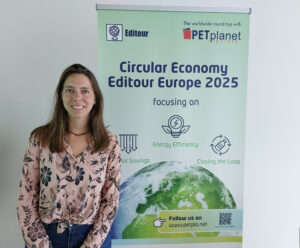
Manon advises Plarebel’s main partners and is partially responsible for managing the organisation. She explained that Plarebel provides guidance on circular plastics to everyone – from students to major institutions – with a particular focus on recycling and packaging. The organisation also conducts research into biobased, biodegradable, compostable, and reusable plastics. She described Plarebel as a “catalyst” that connects key players throughout the circular plastics value chain.
After an hour and a half, I had to take my leave – both inspired and deeply impressed by Manon’s presentation and warm hospitality. Following these three enlightening meetings, I feel like a vessel brimming with knowledge – on EU regulations, the political dimensions of the beverage industry, and the scientific expertise driving a functional plastics cycle. Now it’s time to get out into the field!
I’m very much looking forward to my next stop: Antwerp, where I’ll be visiting the Atlas Copco Group!
Yours,
Heike Fischer
P.S. Did you know that Belgium collected 84% of its PET beverage bottles in 2024? Or that 1,442.2 million litres of soft drinks were consumed—that’s 122.1 litres per capita! And 1,524.89 million litres of packaged water were consumed!
PS: Are you interested in taking part in the tour? Then send us an email to: [email protected]


